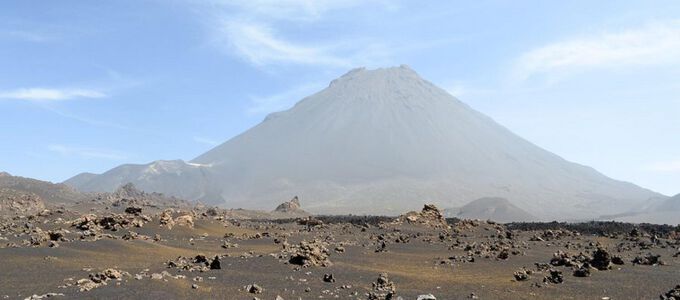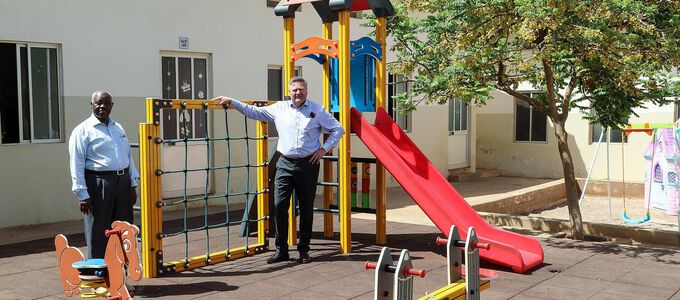
From a hub of the trans-Atlantic slave trade to a melting pot of African traditions. The Cape Verde Islands, situated on the west coast of Africa, have had a turbulent history. Here is a look at the country that the Chief Apostle will visit this week.
Lisbon in Portugal, 1982: District Apostle Hermann Engelauf steps outside a hotel in Lisbon and is approached by a man who says, “I have heard that you are New Apostolic. Please take the Apostles’ teaching to my fellow countrymen in the Cape Verde Islands as well.” This, basically, marks the beginning of the New Apostolic Church in Cape Verde.
Immigration and emigration
Cape Verde is not as green as the name might suggest. In fact, the islands are mountainous and arid. The fifteen islands were named after Cap-Vert, or the Cape Verde Peninsula, on the westernmost point of the African continent, which lies almost exactly on the same latitude.
When the islands were discovered by Portuguese explorers in the fifteenth century, they were still uninhabited. Settlement began from the 1460s, mainly from Portugal. To date, nine of Cape Verde’s fifteen islands are inhabited.
From 1500 to 1620, Cape Verde’s economy flourished due to its significant role in the transatlantic slave trade. But famines often led to many deaths and emigration. With the end of the slave trade, the economic decline began. The legacy of this period, however, is a distinct and diverse culture and language that blends African traditions and Portuguese influences.
In 1975 Cape Verde declared its independence. Political tensions ensued. The situation did not calm down until the constitution was amended in 1990 and the first free elections were held. Economically, the situation was and is tense. In the 1980s, Cape Verde received the highest per capita share of development aid of all African countries.
Today, the largest industry is tourism, but drought, the danger of volcanic eruptions, and few opportunities to earn money force people to migrate.
Divine services in a cinema
In 1981, Chief Apostle Hans Urwyler commissioned District Apostle Hermann Engelauf to spread the teaching of the New Apostolic Church in Portugal and other Portuguese-speaking countries. After being addressed in front of the hotel, he sent Apostle Hermann Magney to Cape Verde. It was he who conducted the first divine service in a rented hotel room in the capital Praia in May 1982. In September 1982, the first four people joined the New Apostolic Church. The first three Deacons were ordained in the same year.
Beginning in 1983, regular church services began to be held in a rented cinema. The congregation grew rapidly and the New Apostolic faith spread to the neighbouring islands as well, even though the ministers had to travel about 14 hours by ship to get from Praia on the island of Santiago to the neighbouring island of Fogo. Despite this, by the end of 1983 there were already about 440 members, one Priest, and nine Deacons on three of the Cape Verde islands.
District Apostle Engelauf, Apostles Manuel Luis and Hermann Magney, and the Minister of Justice of Cape Verde came together for a special meeting on 16 August 1986: the New Apostolic Church was officially recognised by the state. Legend has it that it rained on that day and the Minister of Justice apparently said: “Your appearance in our country has brought rain and this is a great blessing for us.”
A blessing for the country
The New Apostolic Church is not only involved in pastoral care in the islands, however. On 13 February 1999 a complex was inaugurated on which the Church built an elementary school and a kindergarten. The kindergarten is still run by NAK karitativ. Because many parents can hardly afford the fees, the West German aid organisation subsidises hot meals, toys, and school materials and also sponsored climbing frames and a playground in 2022.
In addition to education, helping people to secure their livelihood is one of the main focus areas of NAK karitativ. For example, an agricultural project aims to create a new source of income for one hundred young people and thirty farmers. Because of the warm climate and the lack of rain not much can be cultivated. But NAK karitativ drilled a well and made it possible for people to earn some extra money with agriculture.
During the volcanic eruption on the island of Fogo in 2014, NAK karitativ and the local congregations provided emergency aid to the affected people.
Looking forward to the Chief Apostle
In the meantime, the New Apostolic Church has spread to all nine inhabited islands, and there are members, ministers, and congregations everywhere in Cape Verde. A total of 4,340 members regularly come together for divine services in 64 congregations. The New Apostolic Christians on the islands are cared for by the Regional Church Western Germany..
On 26 February, Chief Apostle Jean-Luc Schneider will visit Cape Verde and conduct a divine service in the capital city of Praia. He will retire Apostle António de Jesus Rocha Semedo after 38 years as a minister in the Church—34 of these as an Apostle. Until further notice, Apostle Dimitrios Vassiliadou Diniz will be in charge of the working area.




















